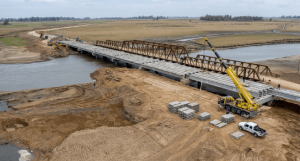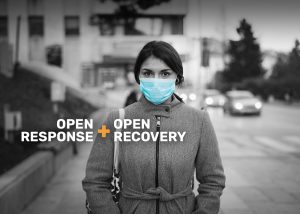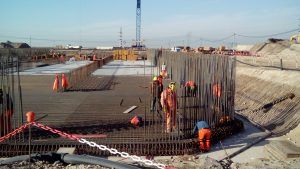Open Contracting for Infrastructure: An OGP Commitment to Support the Recovery
As the world dares to glimpse into the future, the dire state of digital infrastructure and climate change are clear. There is an urgent need for green infrastructure and projects that mitigate climate risks such as floodings. Addressing these infrastructure gaps and picking up the delays of planned infrastructure spending on roads or schools are key.
Infrastructure plays a key role for economic recovery and is an excellent policy area to consider for Open Government PartnershipThe Open Government Partnership (OGP) is a multi-stakeholder initiative focused on improving government transparency, ensuring opportunities for citizen participation in public matters, and strengthen... More (OGP) commitments, as investments should be guided by open government principles. As we build back together, increasing democratic participation, providing open and better information, and tackling corruption in infrastructure projects will be important to ensure that public money in infrastructure is spent in the public interest.
Many countries are putting infrastructure at the center of their economic recovery strategy. The challenge here will be determining how to invest in infrastructure in an equitable and green way. The pandemic has made the need for increasing investments in public health infrastructure such as hospitals and clinics clear. Improving water and sanitationOGP participating governments are in a unique position to address many of the root causes of water issues, including corruption and poor quality, as well as lack of prioritization, access, equity, and... infrastructure are fundamental for a healthy environment as well. We need to make sure that those that have been most at risk benefit from these investments too.
As we slowly recover, we can ensure infrastructure investments are open, inclusive, and sustainable. The following two aspects should be embedded in your OGP commitments.
- Infrastructure procurement and delivery needs to be ‘open by design’ – from the planning of the project until the citizens start using it. Businesses should be able to count on fair competition – with transparent and efficient frameworks that include SMEs and women-owned and minority-owned businesses. Open data across the project lifecycle will link design, planning, and procurement to the desired impacts, such as better health services, new jobs, and market opportunities. A commitment to sustainable infrastructure means reducing the carbon-footprint of supply chains – especially large in the infrastructure sector, using more sustainable materials, and disclosing environmental assessments to ensure quality standards. The City of Buenos Aires in Argentina developed BA Obras, which is a great example of how to disclose data and add friendly visualizations for citizens.While public procurement should be published in a single, online registry as part of a broader mandate to open contracting, infrastructure projects tend to have additional project-level details that are important to capture. Implementing the Open Contracting for Infrastructure Data Standard (OC4IDS), developed in partnership with CoST, optimizes the Open Contracting Data Standard with guidance by CoST’s Infrastructure Data Standard to provide information on the full procurement process for infrastructure projects, including the planning, tender, award, contract and implementation phases. Honduras, for example, is already disclosing data on more than 1,000 projects using the OC4IDS, including public-private partnerships. Nuevo Leon in Mexico has done the same at the regional level.
- We need quality infrastructure that is fit for purpose and delivers the intended benefit to the intended beneficiaries. Citizen oversight has proven to be one of the main deterrents to corruption in infrastructure and improving quality and value for money. Commitments should prioritize citizen-centered design in the project development and build capacity on infrastructure procurement and implementation data to enable effective oversight and monitoring from civil society organizations, businesses, and citizens.
We suggest developing and implementing mechanisms for consultation and independent monitoring by citizens and civil society to ensure affected communities are consulted throughout the full public procurement process. Malawi has been creating accessible channels to collect citizen feedback through the CoST initiative. At the local level, the Nepalese city of Dhangadhi has managed to build infrastructure in time and on budget by integrating citizen monitoring into its infrastructure development.

Beguerie Bridge – an infrastructure project in ArgentinaPHOTO: Credit: Open ContractingA transparent procurement process, known as open contracting, increases competition, improves public service delivery, and ensures governments better value for their money. Technical specifications: C... More Partnership
Open contracting is fast becoming a global norm. Endorsed by the G7 and G20, more than 70 OGP member countries and local governments have made at least one public procurement or open contracting commitment already. More than half of the commitments have already been completed, achieving better results than other commitments.
Successful infrastructure projects are no easy feat, and guidance on better governance is critical. Luckily, the Open Contracting Partnership (OCP) and many of our partners such as CoST can help. To make it easier for OGP members to develop and implement open contracting commitments in the infrastructure sector (in addition to our broader guidance on how to design an open contracting commitment for OGP action plans), we developed a brand new example illustrative commitment on open infrastructure for COVID-19 economic recovery to make it simpler for governments as they can take the pieces that are more useful for each case. As ever, OCP and our helpdesk stand ready to help to make sure your commitments become a success!
No comments yet
Related Content

Effective, Efficient, and Equitable: How Open Government Can Deliver on Vaccines
COVID-19 vaccines are an essential tool in the race to save lives and rebuild economies during the pandemic. Read how open government can help to achieve the effective, efficient, and…

Open Response + Open Recovery
Our community’s fundamental values of accountability, transparency, inclusivity, and responsiveness are vital as we move through COVID-19 response to recovery. Find resources, events and examples from OGP and partners.

A Guide to Open Government and the Coronavirus: Public Procurement
Procurement has become a life or death issue in many countries’ responses to the coronavirus pandemic. In the short-term, emergency procurement is a critical component of any government’s response measures.


Leave a Reply